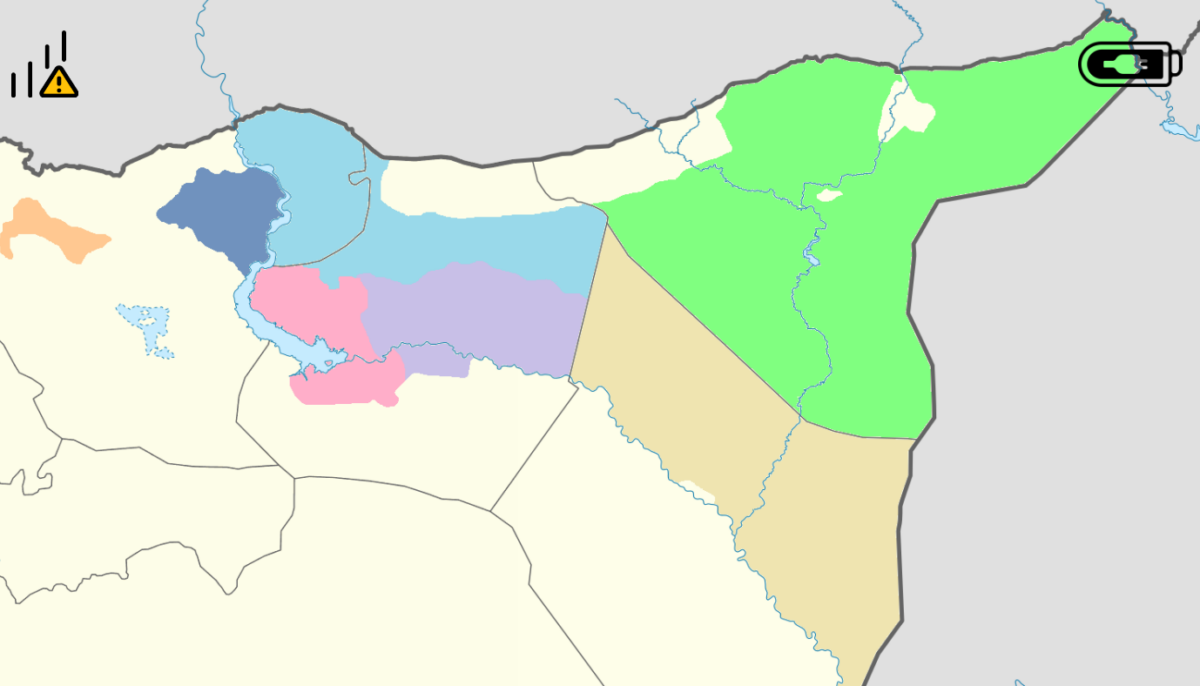In areas such as North and East Syria, internet sources are becoming increasingly limited and difficult to come by. Against the backdrop of anarchy, war, threats of extremist organizations and complex power struggles plaguing the region, lack of internet access has become another critical problem to be addressed. After protests broke out in 2011 and reached Syria’s north and east, authorities cut off internet and cellphone lines in the area, leading to lasting communication problems. As an alternative, people living in the blackout region resorted to their neighboring countries, such as Turkey and Iraq, for telecommunications and internet services.
From 2011 to 2019, the Turkish-Syrian border witnessed an independent attempt to set a system that would allow more access to those living on the Syrian side. The process entailed setting internet transmitters on Turkish land while connecting them to receivers on the Syrian end. Notably, Syrian and Turkish private agents agreed on installing these devices without any official involvement from either government. Homes, institutions and local media outlets thus regained access to the internet.
Prior to this solution, people in the region relied on 3G modems—mobile receivers and routers—that provided internet services via a Vodafone and Turkcell SIM card. High cost and poor quality, however, led them to seek other more viable options. As a result, agents connected towers between Turkey and Syria, establishing a new medium for internet provision. Syria then had several service providers supplying homes with Wi-Fi connection via small routers and transmitters spread across neighborhoods. Clients were charged based on their megabyte consumption.
Some local media outlets and users opted for Tooway—a satellite broadband internet service that provides higher-speed connection. However, the service was short-lived due to the expensive annual subscription, let alone the difficulty in acquiring the parts needed given the complete blockade on the region.
Turkish Censorship on Turkish Internet in Northern Syria
During this phase, roughly from the end of 2011 till early 2019, Turkey imposed strict internet censorship in Kurdish-Syrian areas in the Northeast. Turkish authorities blocked several Arab and local news websites, such as the local HAWARNEWS agency that reports news from that region. Not only that, but It went as far as deleting some Kurdish songs from the Web.
Users also complained about Turkish authorities monitoring and reporting their accounts. Turkish security authorities even asked for the prosecution of Syrian-Kurdish activists on Twitter under various accusations, namely inciting hatred against Turkey. One such case was against Kurdish photojournalist Rodi Said, who works for Reuters News Agency in northeastern Syria. In a talk with SMEX, Said verified this incident: “I received a letter from a Turkish court via email, officially requesting Twitter to shut down my account, which I am unable to access to this day.”
Furthermore, Turkish security authorities were known to spread spyware among users of internet services provided by Turkey in northern Syria. In March 2018, Citizen Lab at the University of Toronto—a laboratory focusing on investigating digital espionage—released a report revealing the presence of a set of MiddleBoxes within the Turk Telecom network. These MiddleBoxes were used to redirect users to spyware-embedded versions of software they had been trying to download. Hafkar Ibrahim, a technical expert who lives outside of Syria, told SMEX: “The problem was that users in Turkey and Syria were redirected to malware riddled with viruses, even when users had downloaded antivirus software from the official site.”
Another Internet Service Provider as of 2019
On March 11, 2019, the Autonomous Administration of North and East Syria issued a decision prohibiting access to internet services provided through the Turkish telecommunications network. Instead, it offered an alternative solution free from Turkish control. Thus, it ushered a new phase for the telecommunications sector under the control of a third, different provider.
Rojava Cell (R-Cell) was authorized by the Autonomous Administration of North and East Syria in 2018 to supply internet services through fiber-optic cables and internet towers from Sulaymaniyah in the Kurdistan Region in Iraq to northern and eastern Syria as of early 2019. R-Cell now provides DSL service through fiber-optic cables from the source to Al-Malikiyah/Derik to be distributed to Qamishli, Al Raqqah, Dir Al-Zour and other areas. The Telecommunications Authority in the Autonomous Administration of North and East Syria later supplies it to agents and representatives, who in turn deliver it to neighborhood and home providers. Lastly, they sell users online packages with unlimited megabytes.
Although R-Cell provides higher-speed connection, users complain that its broadband coverage is poor and does not reach rural areas. In response, the company said it is working on providing wider coverage. Nevertheless, since digital security under the new provider remains ill-defined, Ibrahim advises users to always use VPN applications. Unfortunately, a sustainable solution for the telecommunications issue is yet to be found in Northeast Syria. As internet provision sources remain unstable, digital security in this turbulent region is bound to be compromised.



